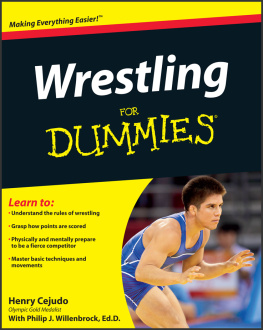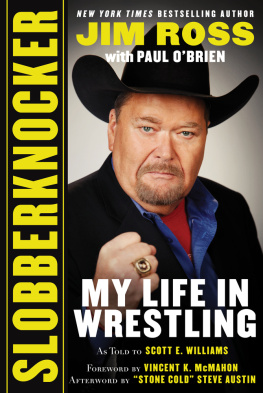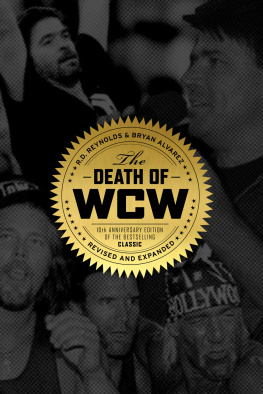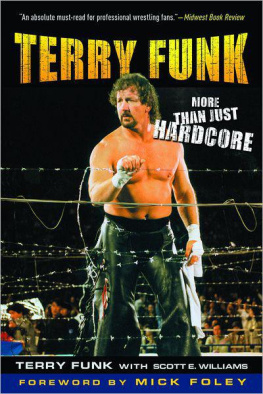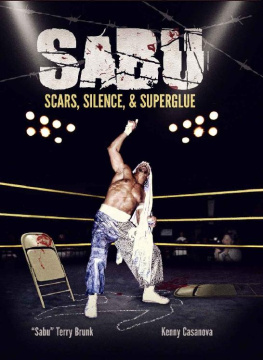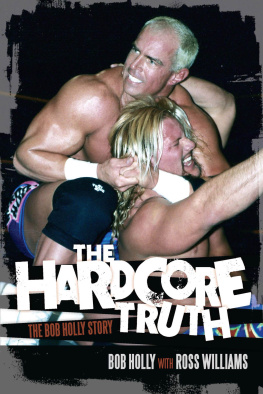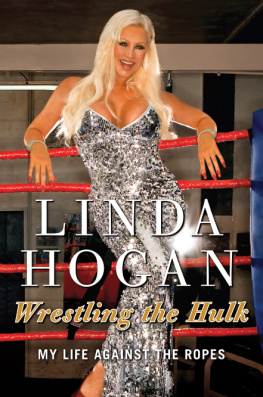TERRY FUNK
More Than Just Hardcore
I dedicate this book to the wrestlers who have never worked a main event in Madison Square Garden, or anywhere, for that matter. I dedicate this book to the wrestlers who perform in Small Town, USA, the ones who know their nights pay wont even cover their transportation costs. I dedicate this book to the guys who have spent themselves totally, for what they consider noble causestheir fans and their families. I dedicate this book to the guys whose special brand of valor shows in their blood and their sweat. I dedicate this book to the wrestlers who have tried valiantly, even though they come up short, again and again.
In other words, I dedicate this book to the jobbersthe wrestlers who have put their shoulders to the mat, purposely and selflessly, to enhance other wrestlers in the fans eyes. They do what they do in the unselfish hope of improving attendance in the weeks to come. They were, and are the unsung heroes of my profession.
This book is also written for my world. Its a small world, and I like it that way. It consists of the ones I love so dearlymy mom, Dorothy; my daughters, Stacy and Brandee; my daughters families, Kelly, Jason, Daniel and Champe.
And this book is for the one, true love I have in this world my wife, Vicki.
FOREWORD
What am I doing here? I asked myself, a tone of dismay accenting my thoughts. It was the first week of January 1995, and here was an old, unheated gym in a small town in Japan, on the third day of a two-week wrestling tour. A genius in the IWA wrestling office had somehow managed to book our tour almost exclusively in unheated gyms throughout the southern part of the country, thinking, I suppose, that the gyms southern proximity would offset the brutally cold Japanese winter of 1995.
As a result, the small group of foreign wrestlers, or gaijins, took to huddling around a portable kerosene heater, or, when lucky enough to find one, making a beeline for the top-of-the-line heated, Japanese toilets. Long after any contributions had been made, the gaijins could be found in these unique laps of luxury, savoring their last moments as warm men before the ringing of a bell, or the yelling of the boss, beckoned them back into the real world of pro wrestling. A world that, in the case of this particular promoter, often consisted of barbed wire, thumbtacks, fire, explosions and the occasional bed of nails.
Unfortunately, on this night, there were no kerosene heaters to comfort me. The heat-bearing bowls that babied my buttocks might as well have been a million miles away! They couldnt help me at that particular point in my life, as I lay underneath the ring, curled into the fetal position, trying to fight off the cold gym floor with the warmth of my own body.
At a designated point, I would emerge from beneath the ring, barbed wire in hand, ready to inflict damage on some more-than-willing foe. Upon my emergence, I would be the picture of pure terror, eyes wild with bloodlust, wielding my bat like a warriors sword. But until that emergence, I would lay on that cold gym floor, continually thinking that same lonely thoughtWhat am I doing here?
Actually, the reason was simple. There was one man to blame, and it sure wasnt me. The culprit Terry Funk. Terry Funk was the reason I had traveled 10,000 miles from home. Terry Funk was the reason I was under that damn ring. Terry Funk was the reason I would return home from that tour (and 15 others like it) looking like some monster from Universals glory days, swaddled in gauze, wrapped in athletic tape, bruised, battered and stitched, with the potpourri of analgesic balm and liquid antiseptic permeating the air around me. Yeah, Terry Funk was to blame. Why? Because Terry Funk was my hero, and I would have followed him anywhere.
I havent seen them all, but I have seen quite a few. If a man of some distinction has graced a wrestling ring in the past 25 years, Ive probably caught his act. I cant accurately state who the greatest of all time is, but I can say without any hesitation that Terry Funk is the greatest wrestler I have ever seen.
What about Ric Flair? I can hear the doubters cry. No doubt, Flair was great, and he and Terry Funk were the only workers Ive ever seen who seemed to exude a love for the wrestling business in their every in-ring step. Funk was simply more believable. When watching Flair, no matter how great the match, with very rare exceptions, I was always aware that I was watching a performance. Terry Funk made me believe.
He made a lot of fans believe. I remember looking at the faces of the fans when the Funker was in action. Looking at the faces of his Japanese faithful in 1980, when he was at his most beloved. They believed. Looking at the faces of the Memphis fans, when he was at his most tyrannical. They believed. Looking at an Atlanta TV audience, when Terry returned from mainstream exile, middle-aged and crazy. They believed.
Maybe it would have been more accurate to say fans suspended their disbelief when Terry Funk took to the ringor the microphone. But he sure made suspending disbelief a breeze. No one in the modern age of wrestling had the ability to make an impact so fully, or so quickly. The arrival of The Funker to a new territory or TV show would inevitably mean that a major change was taking place. Wrestling would almost instantly become a little scarier. A little funnier. A little more believable.
And that change could be infectious. He had that rare ability to bring out the best, not only in his opponents, but in onlookers, as well. Wrestlers raised their game, both physically and verbally, when the Funker came to town, lest they be swept away by the rising tide of increased expectations he left in his wake.
He was as kind as he was crazy. I first met this wrestling legend in November of 1989, a few weeks after his classic I quit match with Ric Flaira match that remains my all-time favorite. You have to lean in kind of close to hear The Funker, for when a microphone isnt present, his voice is tough to hear. But the leaning close is worth ita small price to pay for gaining access to his mind, a vast and fertile field of theories, anecdotes, parables and life lessons, which he is more than happy to pass on.
I met Terry for the second time at a WCW TV taping in Raleigh, N.C. A few novice wrestlers were in the ring, practicing the basics, working on the moves that they hoped would make them stars.
A few of the more seasoned wrestlers were laughing with each other, looking at the ring and then to the arena floor, where Terry Funk stood, observing all the ring holds and slams.
Ill give him one more minute, Brian Pillman said.
Tom Zenk, known as the Z-Man (or as The Funker pronounced it, Zea Man), disagreed.
No way, he said. He cant take it. Look at him. Hes not gonna last.
The countdown began. Well before the minute mark, Terry couldnt take it any longer. To the delight of Pillman and Z-Man, to the bemusement of myself and to the benefit of the novices, Terry Funk rolled into the ring. Within moments, he was rolling around with young wrestlers he had never met, dispensing wisdom and exchanging armbars. He couldnt help himself. He just loves this stuff too much.
In August of 1995, I became the King of the Death Match in Japan by virtue of my victory over Terry Funk.
I wouldnt do this for too many people, he said, in that quiet Funker mumble.
I nodded my head. I know, was all I said.
The victory was not without a price. I received 42 stitches from a variety of wounds, as well as second-degree burns that led to my arm turning a brittle brown by my return flights end. My wife was a little concerned, and placed the blame exactly where it belongedon The Funker.
Mick, she asked. Do you think you could find a different hero?
Yeah, I suppose I could have. I would have had a whole lot fewer stitches. I would have never seen great flaps of charred skin fall from my arm. I might walk a little better.
Next page
